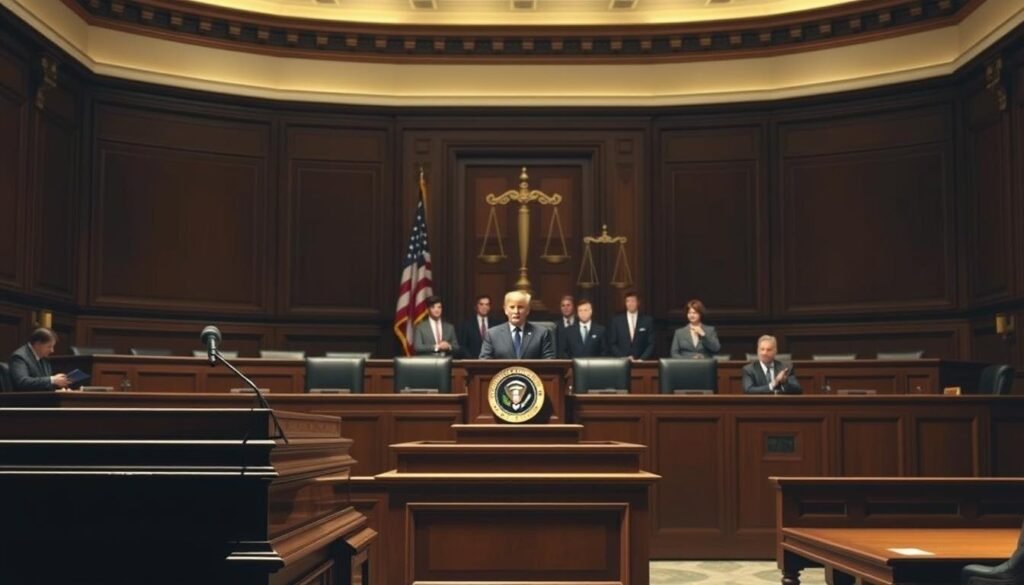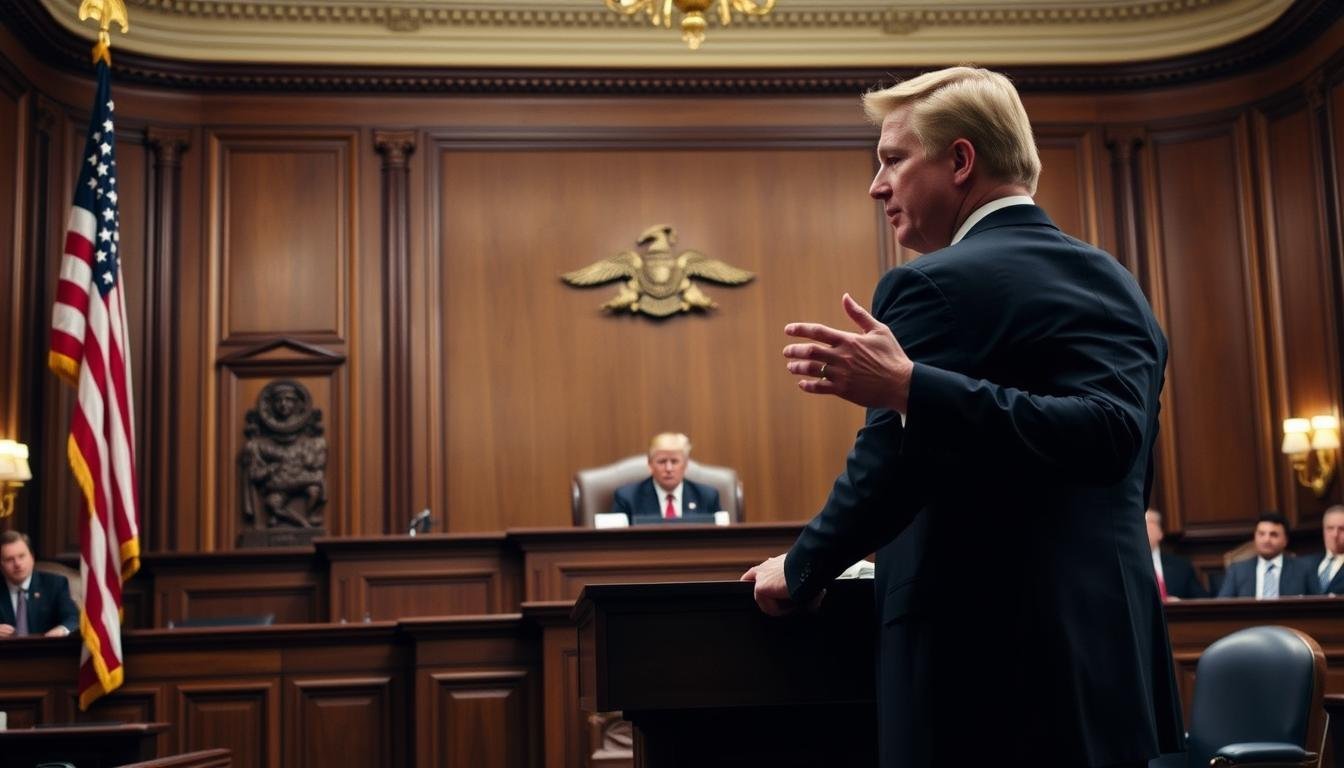Can You Sue the President for Negligence? Wondering if you can sue the president? It’s a complex question that dives into executive immunity. The idea of making a high-ranking official answer for their actions is common. Yet, the legal side is quite detailed.
Looking at presidential negligence cases shows it’s a big issue. It involves history and legal rules that have changed over time. Understanding the obstacles and ways to sue the president can shed light on this complex topic.
By looking at the legal world and what happens when you sue the president, you’ll see the hurdles and chances of making the executive branch answer for their actions.
Contents
- 1 Presidential Immunity: Understanding the Basics
- 2 Historical Precedents: Lawsuits Against U.S. Presidents
- 3 Can You Sue the President for Negligence? The Legal Reality
- 4 Legal Barriers to Suing a Sitting President
- 5 Practical Challenges in Pursuing Presidential Negligence Claims
- 6 Exceptions to Presidential Immunity and Potential Pathways
- 7 Conclusion: Can You Sue the President for Negligence?
- 8 FAQ
- 8.1 What is presidential immunity, and how does it affect lawsuits against the president?
- 8.2 Can you sue the president for negligence while they are in office?
- 8.3 What are the historical precedents for lawsuits against U.S. presidents?
- 8.4 What are the exceptions to presidential immunity?
- 8.5 What are the practical challenges in pursuing presidential negligence claims?
- 8.6 How do you overcome the legal barriers to suing a sitting president?
- 8.7 What is the significance of understanding the legal framework surrounding presidential immunity?
Presidential Immunity: Understanding the Basics
Ever wondered about presidential immunity and suing the president for negligence? This legal doctrine protects the president from some lawsuits. It lets the executive branch work without too much interference. This is based on the separation of powers in the Constitution.
The idea of presidential immunity isn’t clear-cut. The Supreme Court has helped figure out what it means. Knowing how much immunity the president has is key to deciding if you can sue them for negligence.
It’s important to look at the history and reasons behind presidential immunity. It’s meant to keep the president from being bogged down by lawsuits. But, there are limits, and the courts have set rules for when it applies.
Understanding presidential immunity helps you deal with suing the president for negligence. The relationship between immunity, the president’s role, and accountability is complex. Knowing these concepts well is crucial for understanding the legal side of things.
Historical Precedents: Lawsuits Against U.S. Presidents
Looking into lawsuits against U.S. presidents shows the tough job of keeping the highest office in check. Many U.S. presidents have been sued, changing the legal scene in big ways.
Nixon and Clinton Cases
Two big cases involve Presidents Nixon and Clinton. These cases have set key legal rules about suing a president.
President Nixon was sued in Nixon v. Fitzgerald (1982). The Supreme Court said the president can’t be sued for official duties.
President Clinton faced a lawsuit in Clinton v. Jones (1997). The Supreme Court decided a sitting president can be sued for actions before taking office.
| Case | Year | Ruling |
|---|---|---|
| Nixon v. Fitzgerald | 1982 | Absolute immunity for official acts |
| Clinton v. Jones | 1997 | No immunity for pre-office actions |
These cases show the legal hurdles in suing a U.S. president. Courts try to balance holding the president accountable with protecting the office.
See Also: What Are the 5 Requirements to Be President?
Can You Sue the President for Negligence? The Legal Reality
To figure out if you can sue the president for negligence, you need to look at the legal challenges. The president’s immunity from lawsuits is not complete. But, it makes it hard to go after negligence claims.
When suing the president, you must consider several important factors. These include sovereign immunity and the laws that cover the president’s actions. Knowing these can help you build a strong case.
- The nature of the president’s actions
- The extent of the president’s immunity
- The specific laws governing the president’s conduct
Here’s a quick overview of what to think about when considering a lawsuit against the president for negligence:
| Legal Aspect | Description | Relevance to Negligence Claims |
|---|---|---|
| Sovereign Immunity | The doctrine that the government cannot be sued without its consent | Limits the ability to sue the president for negligence |
| Presidential Immunity | The concept that the president is not liable for certain actions performed in their official capacity | Directly impacts the viability of negligence claims against the president |
| Statutory Laws | Laws passed by Congress that govern the president’s actions and the executive branch | Provides the legal basis for determining negligence |
It’s key to understand these legal points when suing the president for negligence. You must carefully look at your case and the laws that apply. This will help you see if your claim is strong enough.
Legal Barriers to Suing a Sitting President
Thinking about suing a sitting president? You’ll face big challenges. These include presidential immunity and issues with where to file the case. These barriers are set up to keep the president and the government from being bothered too much.
One big hurdle is presidential immunity. This rule says the president can’t be sued for things they do as president. It’s meant to keep the president free to do their job without being sued.
Here’s a quick look at the main legal barriers to suing a sitting president:
| Legal Barrier | Description | Impact |
|---|---|---|
| Presidential Immunity | Immunity from civil lawsuits for official acts | Protects the president from litigation distractions |
| Jurisdictional Issues | Difficulty in determining the appropriate court | Delays or complicates the legal process |
| Standing and Justiciability | Requirements for a plaintiff to have a valid claim | Determines whether a case can proceed |
It’s key to know about these legal barriers if you’re thinking of suing a president. You’ll need to figure out how to get past these complex issues to make your case.
Practical Challenges in Pursuing Presidential Negligence Claims
Trying to sue the President for negligence is full of practical hurdles. You’ll face evidentiary issues and procedural challenges. These obstacles need careful thought to build a strong case.
Gathering enough evidence is a big challenge. This is harder when the President is involved. Some documents and information might be classified or hard to get. You also have to follow specific rules, which can be tricky.
Procedural hurdles can slow down or stop your case. Issues like jurisdiction, standing, and immunity might come up. These can be tough to deal with. Knowing these challenges is key to winning a negligence claim against the President.
To beat these challenges, you need to understand the legal rules well. Prepare your case carefully and think about possible obstacles. This way, you can handle the complex issues better.
Exceptions to Presidential Immunity and Potential Pathways
Understanding presidential immunity is key. It shows how legal action can happen. Even though the president has a lot of protection, there are times when they can be sued.
There are exceptions to this immunity. For example, the president can be sued for things done before they took office. Or for personal actions that aren’t part of their job.
- Actions taken before presidency
- Personal conduct unrelated to official duties
- Cases involving criminal acts
There are also other ways to hold the president accountable. Congress can impeach them for serious wrongdoings. The courts can check if the president’s actions are legal.

Looking into these exceptions and other ways to hold the president accountable helps us understand the balance. It’s about protecting the president while also making sure they are responsible for their actions.
Conclusion: Can You Sue the President for Negligence?
Suing the president for negligence is a complex issue. It involves balancing presidential accountability and executive function. The legal framework and historical precedents show the challenges in holding the president liable.
Considering the practical implications, it’s clear that balancing accountability and immunity is crucial. The executive branch must function well while being accountable for its actions. Understanding the legal complexities helps navigate presidential negligence claims.
Ensuring presidential accountability while preserving the executive branch’s integrity is a nuanced task. It requires careful consideration of competing interests and the potential implications of holding the president liable. By striking the right balance, accountability is promoted, and the executive function remains effective.
See Also: Can the President Fire Government Employees?
FAQ
What is presidential immunity, and how does it affect lawsuits against the president?
Presidential immunity is a legal rule that protects the president from some lawsuits. It lets the executive branch work without too much trouble. But, this immunity isn’t complete and has been debated by courts. This debate affects if you can sue the president.
Can you sue the president for negligence while they are in office?
It’s hard to sue the president for negligence while they’re in office because of legal barriers. The courts say the president isn’t completely immune. But, there are big challenges to get past.
What are the historical precedents for lawsuits against U.S. presidents?
There have been famous cases against sitting U.S. presidents, like Nixon and Clinton. These cases set important legal rules that still shape today’s laws.
What are the exceptions to presidential immunity?
Even with presidential immunity, there are exceptions and ways to go around it. Knowing these exceptions and other paths is key to figuring out if you can sue the president for negligence.
What are the practical challenges in pursuing presidential negligence claims?
Going after a negligence claim against the president faces legal and practical hurdles. You need strong evidence and to follow the right steps to build a solid case.
How do you overcome the legal barriers to suing a sitting president?
To get past legal barriers, you must understand the reasons behind them and what they mean for your case. Looking at the specific legal issues, like immunity and where to sue, helps you tackle the case’s complexities.
What is the significance of understanding the legal framework surrounding presidential immunity?
Knowing the legal framework is crucial to see if you can sue the president for negligence. The law is complex and challenging. Studying the relevant laws, court decisions, and the Constitution gives a better grasp of what’s possible and what’s not.

Hi, I am Tatum Bradford from Washington. I have a background in political science and work as a senior revenue officer. I love learning about U.S. presidents and sharing interesting facts about political history.

